Racial Justice Action Plan
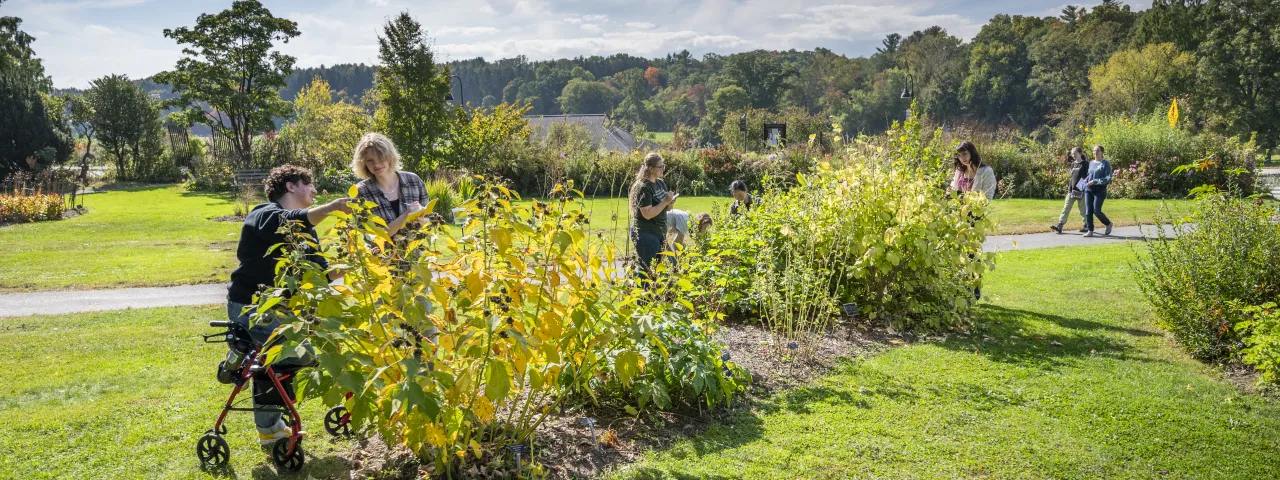
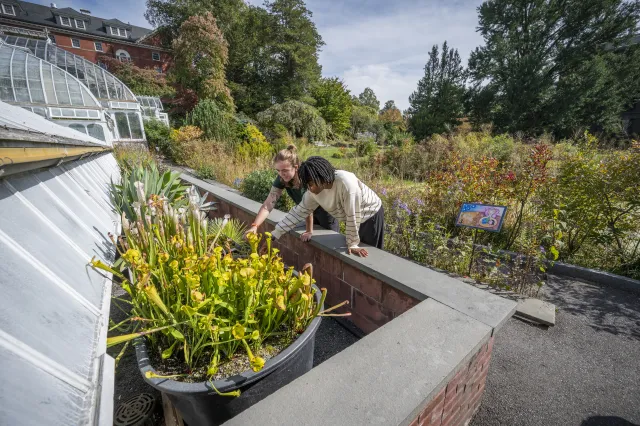
In 2019, in accordance with an imperative in our first-ever strategic plan, the Botanic Garden of Smith College reimagined its mission as the following:
The Botanic Garden of Smith College fosters environmental and social justice through teaching and learning about plants, people and place.
We do this by:
- Curating plant collections that share stories about plant and human diversity.
- Training students to be informed thought leaders and change agents.
- Helping teachers develop integrative, learner-centered experiences.
- Welcoming all visitors to explore, learn and contribute their knowledge.
- Cultivating spaces and landscapes that stimulate thought, creativity, collaboration and well-being.
The centrality of equity and inclusion in this statement, and in the strategic plan that it emerged from, reflects lessons and understandings from years of a deliberate and active approach to seeing and confronting an unacceptable reality—that the botanic garden’s spaces, resources, and benefits were not being accessed equally by the full spectrum of our community. We understand this reality to be the direct result of barriers, both visible and invisible, that prevented some students, colleagues, and community partners from feeling the same sense of belonging and connection to the botanic garden that others did. These disparities are particularly clear with respect to racial identity. The only way to pursue our shared goal of an equitable and inclusive learning environment is to actively seek out and center the voices of marginalized identities and proactively shed light on the limitations of our impact due to being an all-white staff.
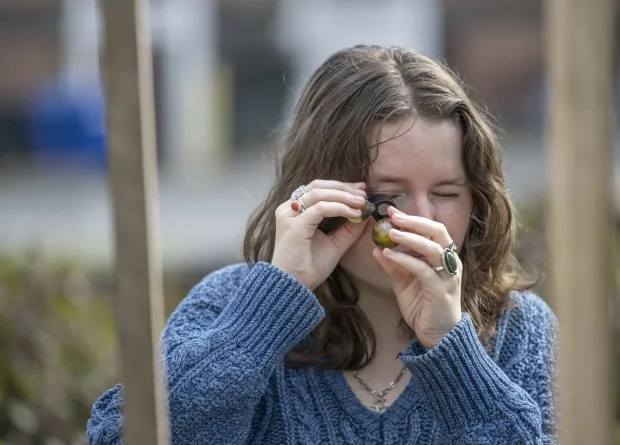
PAST AND ONGOING WORK
2018 marked a crucial pivot from a passive to an active approach to equity and inclusion at the botanic garden, in the form of proactive outreach to and engagement with students of color, on campus organizations and units that advocated in and for their voices, and community partners with diverse perspectives.
Some examples of the ways we changed and expanded our approach include:
Centering Community
- Hosting listening sessions with students of color.
- Collaborating with the Office of Multicultural Affairs, and other cultural identity groups on outreach to ensure students of color can access all botanic garden experiences.
- Co-learning with our partners through teaching circles, seminars, course collaborations, and hosting a diverse range of speakers and lecturers.
- Actively inviting our communities in through partnering on exhibits and conservation initiatives.
- Working with Smith students to assess the botanic garden using American Public Garden Association’s (APGA) sustainability index, and pursuing APGA accreditation for excellence in Employee Development, Diversity, and Inclusion.
Alignment of Collections and Pedagogy
- Completion of a Collections Management Plan that aligns plant collections with their purpose as a resource for reparative education, research, and conservation.
- Development of a Learning Engagement Plan that establishes guiding principles around our approaches to education, expressly naming an equitable and inclusive approach to teaching, interpretation, and curriculum development.
- Commitment to developing our interpretation and programming around themes of science, culture, and place which prioritizes the study of plants through diverse lenses and perspectives.
- Outreach to regional Indigenous leadership to begin collections building initiatives that support their communities.
Laying the Foundation
- Completing our 2019–2024 Strategic Plan which identifies equity and inclusion as a fundamental priority.
- Revising our mission statement to affirm the botanic garden’s commitment to inclusion and equity, and to prioritize co-creation of knowledge and active learning.
- Exploring a reimagined and redesigned Lyman Plant House that creates a welcoming, accessible, and engaging first impression for all visitors.
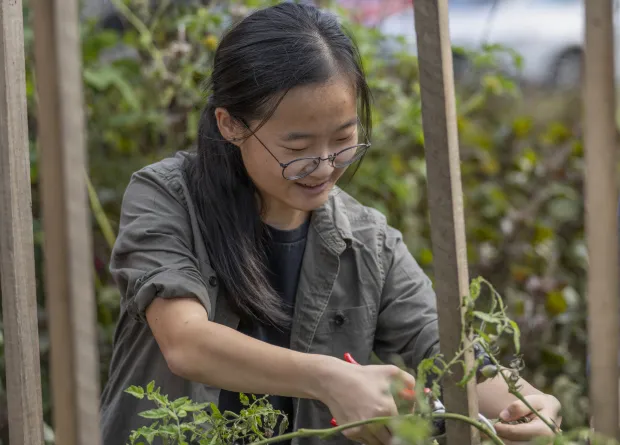
Carrying this work Forward
In recognition of the innate joy and benefits of inclusive and equitable community building, we are joining our colleagues across Smith College in crafting a departmental Racial Justice Action Plan intended to articulate a path forward that truly reflects our shared values. Taking forward the lessons we have learned from past work, we envision our continuing efforts centering on three major areas:
STAFF
The botanic garden recognizes the need for a more diverse staff to foster an inclusive, equitable culture of work, learning, and collaboration. We understand that representation matters and enables our students to see themselves on paths that may feel unfamiliar or unwelcoming to them. We understand that success is measured not just in the recruitment process but in ensuring that every staff member feels seen and celebrated as their whole self and as a valued part of our team.
SPACES AND COLLECTIONS
We are committed to creating spaces and collections within the botanic garden that tell a broader set of stories, interrogate the colonial history of botanic gardens, and actively promote a sense of belonging for identities that have been historically marginalized by European and white-dominated discourses and priorities. This involves curating exhibits, events, and educational programs that center the voices of groups that have previously been excluded from the production of knowledge and interpretation of collections and museums.
RELATIONSHIPS AND COMMUNITY
Investing time, energy, and resources in building relationships within and beyond the Smith community is paramount to the success of our action plan. We will proactively seek partnerships with diverse organizations to ensure that the relationships we cultivate reflect the true diversity of the college, the region, and the history of the land we steward.
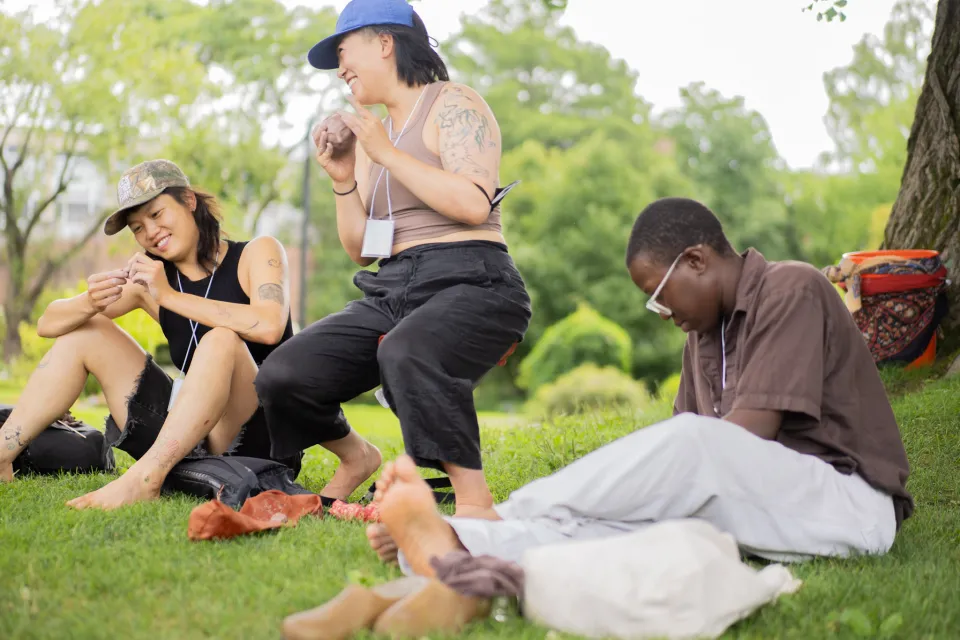
Over 300 land stewards converged on Smith campus for the Northeast Farmers of Color Land Trust’s inaugural We the Land! convergence.
In this plan, we also aim to acknowledge and honor the history of the land that Smith occupies with deep-rooted connections to local Indigenous groups, including the Nipmuc tribal nation, who have been here for thousands of years and who remain here today. It is imperative that our Racial Justice Action Plan recognizes and respects this rich heritage and acknowledges the often-brutal land and cultural theft that set the stage for our presence here. As we move forward, the botanic garden is dedicated to fostering meaningful collaborations with local Indigenous communities, ensuring their voices and priorities are heard and reflected authentically in our shared work.
Seeing the need for a path of restorative justice becomes unavoidable when one considers that the history of botanic gardens is entangled with the history of colonialism and exploitative economies that shape where wealth, privilege, and power reside today. We feel grateful to be positioned in the heart of a vibrant liberal arts institution that encourages us to explore these difficult histories and the shadows they cast on the present. We will be stronger as an institution and better serve our mission by inviting our community to be part of the examination of our history and the shaping of our future priorities. We also acknowledge that this work can only succeed when we understand that all interactions occur between people who are impacted by societal inequities. We must explicitly reject the privilege of distancing ourselves from this reality and infuse the principles of equity and inclusion into everything we do.
We have identified the following priorities and associated action steps to move us forward. This work will be ongoing and adapted to our evolving understanding of how best to dismantle barriers to both the global and local botanic garden community and foster a collaborative and productive environment of equity and inclusion.
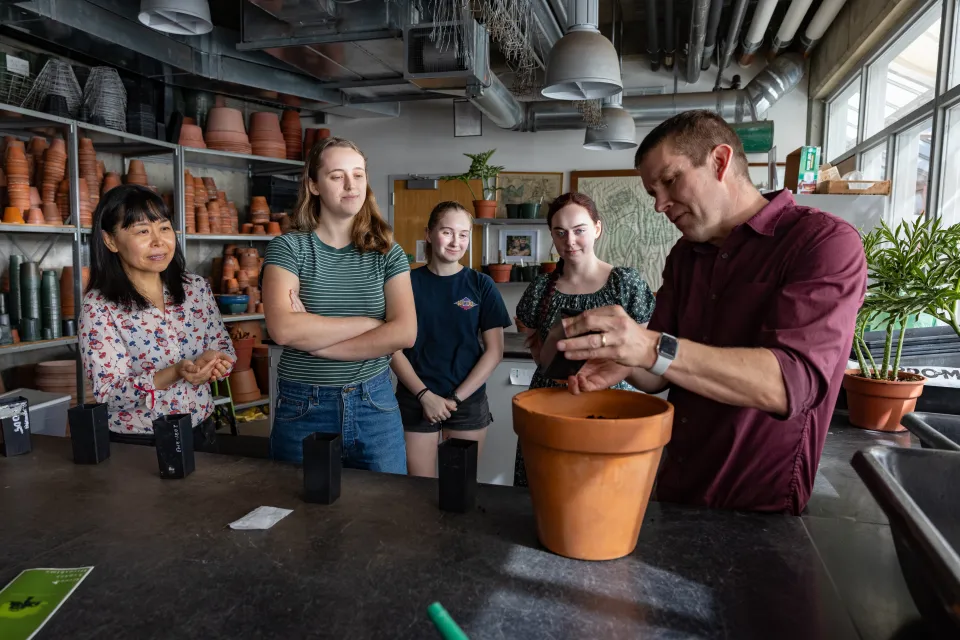
Working with Senior Lecturer in Japanese Atsuko Takahashi and her students as we steward seeds from survivor trees as part of the global Green Legacy Hiroshima project.
Conclusion
The mission and values of the Botanic Garden of Smith College demand that we seek and make the most of every opportunity to build an equitable sense of belonging in our spaces and programming. We are extremely fortunate that the student community we serve is diverse and, through respectful engagement, can help us learn to live out this goal authentically. Furthermore, we do not see this work as being separate from an equally strong effort to understand and work against all dimensions of inequity and the many ways they intersect with and stand next to racism. The action steps above will, in many cases, provide ways to push back on cultural practices that normalize marginalization and stand in the way of belonging for all identities. The action steps above will, in many cases, provide ways to push back on cultural practices that normalize marginalization and stand in the way of belonging and will create a foundation for devising new co-created cultural practices that include and center those who have been historically excluded.
We acknowledge with humility that the action items and goals stated within this plan represent a vision crafted by an all-white staff and our understanding of this work at a moment in time.
The authors of this plan are deeply grateful for the generosity of our accountability partners who have challenged us to distill the work described here and who have strengthened the language and ideas within it through their critique and perspectives. These individuals represent student, staff, and faculty stakeholders. We extend our deep gratitude to Valerie Joseph, Abril Navarro, L’Tanya Richmond, EJ Seibert ’08, Marge Poma Alarcon ’23, Efadul Huq, and Jess Gersony.
We will continue to seek improvement in the content of this plan and revise it as often as needed to best reflect the voices and needs of Smith College, the broader community that we serve, and the learning that we are all undertaking together.
The Botanic Garden of Smith College
Equity & Inclusion Committee
June 2024
John Berryhill, Director
Lily Carone, Greenhouse Horticulturist
Gaby Immerman, Experiential Learning Specialist
Sarah Loomis, Manager of Education